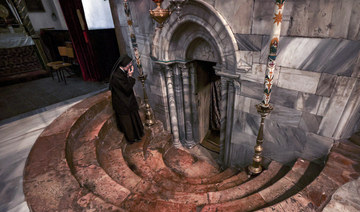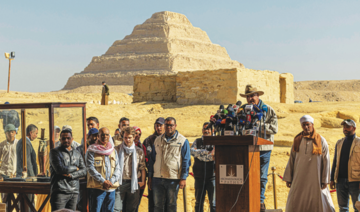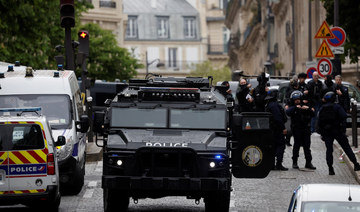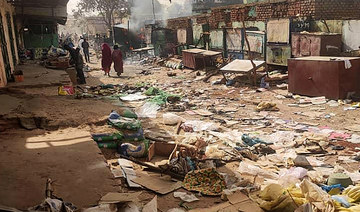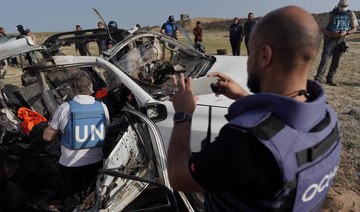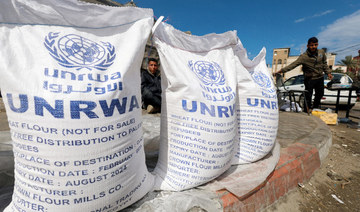BETHLEHEM, West Bank: An ivory spoon dating back 2,700 years that was recently repatriated to the Palestinian Authority from the United States has sparked a dispute with Israel’s new far-right government over the cultural heritage in the occupied West Bank.
The clash brings into focus the political sensitivities surrounding archaeology in the Middle East, where Israelis and Palestinians each use ancient artifacts to support their claims over the land.
Israel’s ultranationalist heritage minister has ordered officials to examine the legality of the US government’s historic repatriation of the artifact to the Palestinians earlier this month, and is calling for annexing archaeology in the occupied West Bank.
The artifact — a cosmetic spoon made of ivory and believed to have been plundered from a site in the West Bank — was seized in late 2021 by the Manhattan District Attorney’s office as part of a deal with the New York billionaire hedge fund manager Michael Steinhardt.
It was one of 180 artifacts illegally looted and purchased by Steinhardt that he surrendered as part of an agreement to avoid prosecution.
American officials handed an artifact over to the Palestinian Ministry of Tourism and Antiquities on Jan. 5 in what the US State Department’s Office of Palestinian Affairs said was “the first event of such repatriation” by the US to the Palestinians.
Dozens of Steinhardt’s surrendered artifacts have already been repatriated to Italy, Bulgaria, Greece, Turkiye, Jordan, Libya and Israel. This spoon was the first and only item ever to be repatriated to the Palestinians.
The repatriation coincided with the first weeks of Israel’s new government, which is composed of ultranationalists who see the West Bank as the biblical heartland of the Jewish people and inextricably linked to the state of Israel.
Heritage Minister Amihai Eliyahu’s office said last week that the legality of the repatriation “is being examined by the archaeology staff officer with the legal counsel, which will examine all aspects of the matter, including the Oslo Accords that the US has signed.”
The case underscores how archaeology and cultural heritage are intertwined with the competing claims of the Israelis and Palestinians in the decades-long conflict.
“Any artifact that we know that it comes out illegally from Palestine, we have the right to have it back,” said Jihad Yassin, director general of excavations and museums in the Palestinian Tourism and Antiquities Ministry. “Each artifact says a story from the history of this land.”
The ministry is part of the Palestinian Authority, the government established as part of the Oslo Accords in the 1990s that exercises limited autonomy in parts of the Israeli-occupied West Bank.
Those agreements between Israel and the Palestinians were supposed to include coordination on a raft of issues, including archaeology and cultural heritage.
But the agreements have largely unraveled. Yassin said that the archaeology committee has not met in around two decades, and that there is virtually zero coordination between Israel and the Palestinians concerning antiquities theft prevention in the West Bank.
“We try to do our best to protect these archaeological sites, but we face difficulties,” he said.
Yassin said that around 60 percent of the West Bank’s archaeological sites are in territory under complete Israeli military control, and that his ministry’s theft prevention workers “manage to control in a high percentage the looting” in areas under Palestinian Authority control.
Nonetheless, many of the illicit artifacts that have made their way to Israel’s legal antiquities market were looted from the West Bank, he said.
According to court documents, Steinhardt bought the ivory cosmetic spoon in 2003 from Israeli antiquities dealer Gil Chaya for $6,000. The artifact had no provenance — paperwork detailing where it came from and how it had entered the dealer’s inventory — but Chaya said the object was from the West Bank town of El-Koum, which is under Palestinian Authority control.
Another artifact believed to have been looted from the same town, a “Red Carnelian Sun Fish amulet (that) dates to circa 600 B.C.E.,” remains missing, according to the DA’s office. Steinhardt has yet to locate the item, but if it is found, it will be repatriated to the Palestinians, the office said.
American authorities returned 28 objects to Israel last year, not including three that were seized in place at the Israel Museum of Jerusalem. Seven others meant to be returned to Israel have yet to be found. Several of the items returned to Israel are believed to have been looted from the West Bank.
The Israel Antiquities Authority declined comment on the artifact’s repatriation to the Palestinians.
Heritage Minister Eliyahu, a religious ultranationalist in Netanyahu’s government now in charge of the country’s Antiquities Authority, denies the existence of a Palestinian people.
Since taking office, he has accused the Palestinian Authority of committing “national terrorism” and “erasing heritage” at an archaeological site in a Palestinian-controlled area near the West Bank city of Nablus.
It remains unclear what impact, if any, a review by the ministry’s legal counsel could have. It appears unlikely Israel could confiscate the artifact from the Palestinians, but a legal opinion against the move could potentially complicate future repatriations.
Earlier this week, Eliyahu said he would be giving the Israel Antiquities Authority full control over archaeological sites, cultural heritage and theft prevention throughout the West Bank — a move that critics say would in effect apply Israeli law over occupied territory in breach of international law.
Currently, archaeological excavations and antiquities in the West Bank are managed by the Civil Administration’s archaeology staff officer, which is part of the Defense Ministry. Israel has not formally annexed the West Bank, and the territory is treated as occupied and is governed under military law.
“All heritage on both sides of the green line will earn full protection, at an international and scientific standard,” Eliyahu wrote in a Facebook post on Sunday. He said the state of Israel would “act in a uniform and professional manner from the (Mediterranean) sea to the Jordan.”
Alon Arad, director of Israeli cultural heritage non-governmental organization Emek Shaveh, said that putting the Israel Antiquities Authority in charge of archaeology in the occupied territory was “activating Israeli law in the West Bank, which means annexation.”
Eliyahu’s office declined repeated interview requests.
Yassin said that for the time being, the artifact will remain at the ministry, where it will be studied by one of its archaeologists. Then, he said, it will be displayed at one of the West Bank’s museums.
“It’s not the only one,” Yassin said. “It is the beginning.”
Israel probes legality of US giving artifact to Palestinians
https://arab.news/638sc
Israel probes legality of US giving artifact to Palestinians
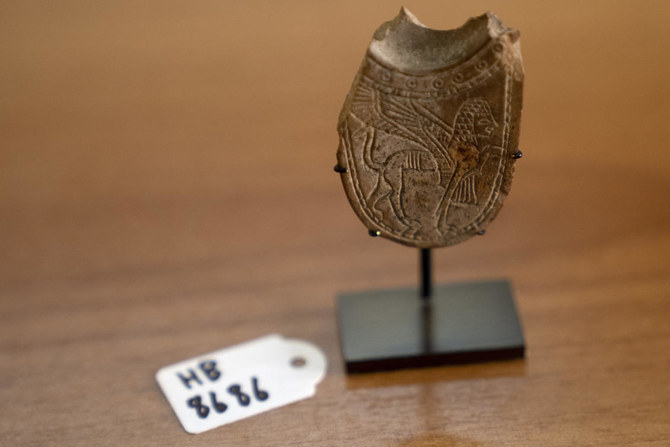
- The clash brings into focus the political sensitivities surrounding archaeology in the Middle East
- Israelis and Palestinians each use ancient artifacts to support their claims over the land
Israeli airstrike in southern Gaza city of Rafah kills at least 9 Palestinians, including 6 children
Israeli airstrike in southern Gaza city of Rafah kills at least 9 Palestinians, including 6 children

- Strike late Friday hit a residential building in the western Tel Sultan neighborhood of the city of Rafah
Israel’s war against the Islamic militant group Hamas has led to a dramatic escalation of tensions in an already volatile Middle East.
The strike late Friday hit a residential building in the western Tel Sultan neighborhood of the city of Rafah, according to Gaza’s civil defense. The bodies of the six children, two women and a man were taken to Rafah’s Abu Yousef Al-Najjar hospital, the hospital’s records showed.
At the hospital, relatives cried and hugged the bodies of the children, wrapped in white shrouds, as others comforted them.
The fatalities included Abdel-Fattah Sobhi Radwan, his wife Najlaa Ahmed Aweidah and their three children, his brother-in-law Ahmed Barhoum said. Barhoum also lost his wife, Rawan Radwan, and their 5-year-old daughter Alaa.
“This is a world devoid of all human values and morals,” Barhoum told The Associated Press Saturday morning, crying as he cradled and gently rocked the body of Alaa in his arms. “They bombed a house full of displaced people, women and children. There were no martyrs but women and children.”
No victims were registered from a second overnight strike in the city.
Rafah, which lies on the border with Egypt, currently hosts more than half of Gaza’s total population of about 2.3 million people, the vast majority of whom have been displaced by fighting further north in the territory.
Despite calls for restraint from the international community, including Israel’s staunchest ally, the United States, the Israeli government has insisted for months that it intends to push a ground offensive into the city, where it says many of the remaining Hamas militants are holed up.
Such a ground operation has not materialized so far, but the Israeli military has repeatedly carried out airstrikes on and around the city.
The war was sparked by an unprecedented raid into southern Israel by Hamas and other militant groups on Oct. 7 that left about 1,200 people dead, the vast majority of them civilians, and saw about 250 people kidnapped and taken into Gaza. Israel says about 130 hostages remain in Gaza, although more than 30 have been confirmed to now be dead, either killed on Oct. 7 or having died in captivity.
The Gaza Health Ministry said Saturday the bodies of 37 people killed by Israeli strikes were brought to hospitals in Gaza over the past 24 hours. Hospitals also received 68 wounded, it said. The latest figures bring the overall Palestinian death toll from the Israel-Hamas war to at least 34,049, and the number of wounded to 76,901, the ministry said. Although the Hamas-run health authorities do not differentiate between combatants and civilians in their count, they say at least two thirds have been children and women.
The war has sent regional tensions spiraling, leading to a dramatic eruption of violence between Israel and its archenemy Iran that threatened to escalate into a full-blown war.
On Friday, both Iran and Israel played down an apparent Israeli airstrike near a major air base and nuclear site in central Iran, indicating the two sides were pulling back from what could have become an all-out conflict. Over the past several weeks, an alleged Israeli strike killed two Iranian generals at an Iranian consulate in Syria and was followed by an unprecedented Iranian missile barrage on Israel.
Israel has also faced off with the Hezbollah militant group, an Iranian proxy operating from Lebanon, with the two sides there frequently trading rocket and drone attacks across the Lebanese-Israeli border. Yemen’s Iran-backed Houthi rebels have also joined the fray, launching strikes against merchant ships in the Red Sea and the Gulf of Aden in what they say is a campaign of solidarity with the Palestinians in Gaza.
Tension has also been high in the occupied West Bank, where an Israeli military raid Friday in the Nur Shams refugee camp killed at least four Palestinians, including three militants, according to the Israeli military, Palestinian health officials and a militant group.
Palestinian health authorities said one of those killed was a 15-year-old boy shot dead by Israeli fire. The Islamic Jihad militant group confirmed the deaths of three members, including one who it said was a local military commander. The Israeli military said four Israeli soldiers were slightly wounded in the operation.
Saraya Al-Quds, the military arm of Islamic Jihad, said its fighters had engaged in heavy gunbattles Saturday morning with Israeli forces in the town of Tulkarem, adjacent to Nur Shams. No further details were immediately available. Residents in Tulkarem went went on a general strike Saturday to protest the attack on Nur Shams, with shops, restaurants and government offices all closed.
Since the Oct. 7 Hamas attack on southern Israel, more than 460 Palestinians have been killed by Israeli fire in the West Bank, Palestinian health officials say. Israel stages frequent raids into towns and cities in the volatile territory. The dead have included militants, but also stone-throwers and bystanders. Some have also been killed in attacks by Israeli settlers.
Iran FM downplays reported Israeli retaliation

- Israeli officials have made no public comment on what happened Friday
- Overnight last Saturday-Sunday Iran launched its first-ever direct attack on Israeli territory
Tehran: Iran’s foreign minister has dismissed as akin to child’s play the reported Israeli retaliation for an unprecedented Iranian strike, and said Tehran would not respond unless Iranian “interests” were targeted.
On Friday, Iran’s state media reported explosions were heard after, according to an official, small drones were successfully shot down.
Media in the United States quoted officials there as saying Israel had carried out strikes in retaliation for Tehran’s drone and missile barrage fired at Israel last weekend.
“What happened last night was no attack,” Foreign Minister Hossein Amir-Abdollahian told NBC News in a Friday interview.
“It was the flight of two or three quad-copters, which are at the level of toys that our children use in Iran.”
He added that, “As long as there is no new adventure on behalf of the Israeli regime against Iran’s interests, we will have no response.”
Friday’s explosions prompted world leaders to appeal for calm and de-escalation with fears of wider conflict against the backdrop of the war in Gaza which began on October 7.
Overnight last Saturday-Sunday Iran launched its first-ever direct attack on Israeli territory. The barrage was in response to a deadly April 1 air strike on Tehran’s consulate in Damascus, which Iran blamed on Israel.
The Israeli army said the vast majority of the more than 300 missiles and drones fired by Iran were shot down — with the help of the United States and other allies — and that the attack caused only minimal damage.
Israeli officials have made no public comment on what happened Friday, and analysts said both sides are looking to de-escalate, for now.
“If the Israeli regime intends to take another action against our interests, our next response will be immediate and to the maximum,” Amir-Abdollahian said in the interview.
Tehran plays down reported Israeli attacks, signals no further retaliation
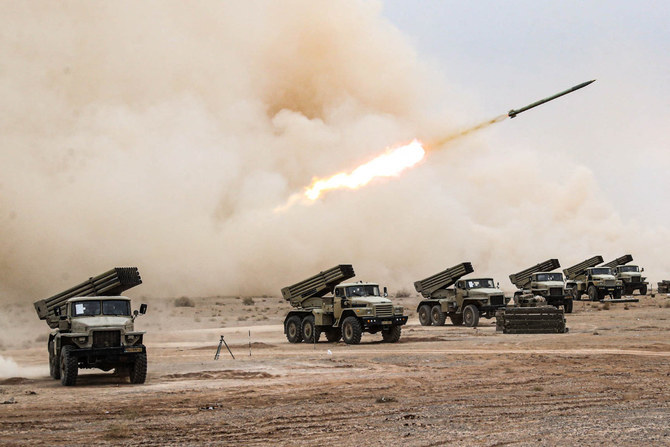
- United States received advance notice of Israel’s reported strike on Iran, reports US media
- Countries around the world called on both sides to avert further escalation amid tensions
DUBAI/JERUSALEM: Explosions echoed over an Iranian city on Friday in what sources described as an Israeli attack, but Tehran played down the incident and indicated it had no plans for retaliation — a response that appeared gauged toward averting region-wide war.
The limited scale of the attack and Iran’s muted response both appeared to signal a successful effort by diplomats who have been working round the clock to avert all-out war since an Iranian drone and missile attack on Israel last Saturday.
Iranian media and officials described a small number of explosions, which they said resulted from Iran’s air defenses hitting three drones over the city of Isfahan. Notably, they referred to the incident as an attack by “infiltrators,” rather than by Israel, obviating the need for retaliation.
An Iranian official said there were no plans to respond against Israel for the incident.
“The foreign source of the incident has not been confirmed. We have not received any external attack, and the discussion leans more toward infiltration than attack,” the official said.
Israel said nothing about the incident. It had said for days it was planning to retaliate against Iran for Saturday’s strikes, the first ever direct attack on Israel by Iran in decades of shadow war waged by proxies which has escalated throughout the Middle East through six months of battle in Gaza.
The United States received advance notice of Israel’s reported strike on Iran but did not endorse the operation or play any part in its execution, US media quoted officials as saying.
NBC and CNN, citing sources familiar with the matter and a US official, respectively, said Israel had provided Washington with pre-notification of the strike.
Various networks cited officials confirming a strike had taken place inside Iran, with CNN quoting one official as stating the target was not a nuclear facility.
The two longstanding foes had been heading toward direct confrontation since a presumed Israeli airstrike on April 1 that destroyed a building in Iran’s embassy compound in Damascus and killed several Iranian officers including a top general.
Iran’s response, with a direct attack on Israel, was unprecedented but caused no deaths and only minor damage because Israel and its allies shot down hundreds of missiles and drones.
Allies including the United States had since been pressing hard to ensure any further retaliation would be calibrated not to provoke a spiral of hostilities. The British and German foreign ministers visited Jerusalem this week, and Western countries tightened sanctions on Iran to mollify Israel.
In a sign of pressure within Israel’s hard-right government for a stronger response, Itamar Ben Gvir, the far-right national security minister tweeted a single word after Friday’s strikes: “Feeble!.”
Countries around the world called on Friday for both sides to avert further escalation.
“It is absolutely necessary that the region remains stable and that all sides restrain from further action,” EU Commission head Ursula von der Leyen said. Similar calls came from Beijing and from Arab states in the region.
In financial markets, global shares eased, oil prices surged and US bond yields fell as traders worried about the risks.
NO MENTION OF ISRAEL
Within Iran, news reports on Friday’s incident made no mention of Israel, and state television carried analysts and pundits who appeared dismissive about the scale.
An analyst told state TV that mini drones flown by “infiltrators from inside Iran” had been shot down by air defenses in Isfahan.
Shortly after midnight, “three drones were observed in the sky over Isfahan. The air defense system became active and destroyed these drones in the sky,” Iranian state TV said.
Senior army commander Siavosh Mihandoust was quoted by state TV as saying air defense systems had targeted a “suspicious object.”
Iranian President Ebrahim Raisi had warned Israel before Friday’s strike that Tehran would deliver a “severe response” to any attack on its territory.
Iran told the United Nations Security Council on Thursday that Israel “must be compelled to stop any further military adventurism against our interests” as the UN secretary-general warned that the Middle East was in a “moment of maximum peril.”
By morning, Iran had reopened airports and airspace that were shut during the strikes.
Still, there was alarm over security in Israel and elsewhere. The US Embassy in Jerusalem restricted US government employees from travel outside Jerusalem, greater Tel Aviv and Beersheba “out of an abundance of caution.”
In a statement, the embassy warned US citizens of a “continued need for caution and increased personal security awareness as security incidents often take place without warning.”
Israel’s assault on Gaza began after Hamas Islamists attacked Israel on Oct. 7, killing 1,200, according to Israeli tallies. Israel’s military offensive has killed about 34,000 Palestinians in Gaza, according to the Gazan health ministry.
Iran-backed groups have declared support for Palestinians, carrying out attacks from Lebanon, Yemen and Iraq, raising fears the Gaza conflict could grow into a wider regional war.
UN warns of new flashpoint in Sudan’s Darfur region
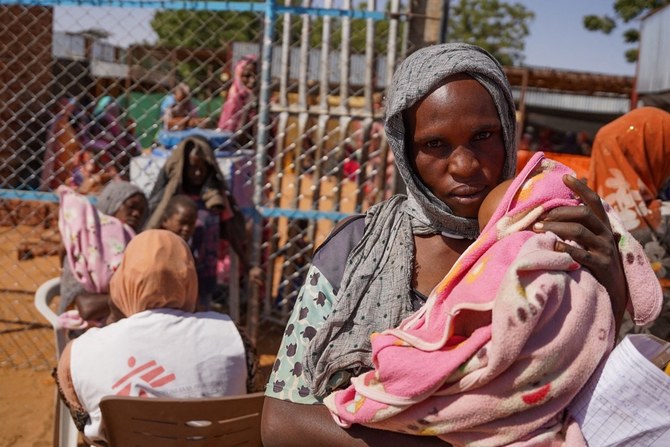
- El-Fasher acts as a humanitarian hub for Darfur, which is home to around a quarter of Sudan’s 48 million inhabitants
United Nations, US: Senior UN officials warned the Security Council on Friday of the risks of a new front opening in Sudan, around the town of El-Fasher in Darfur, where the population is already on the brink of starvation.
After a year of war between the armed forces (SAF) of General Abdel Fattah Al-Burhan and the paramilitaries of the Rapid Support Forces (FSR), under the command of General Mohamed Hamdan Dagalo, the country is experiencing “a crisis of epic proportions... wholly man-made,” denounced Rosemary DiCarlo, UN under-secretary-general for political and peacebuilding affairs.
“The warring parties have ignored repeated calls to cease their hostilities... Instead, they have stepped up preparations for further fighting, with both the SAF and the RSF continuing their campaigns to recruit civilians,” DiCarlo said.
In particular, she voiced concern at reports of a possible “imminent” attack by the RSF on El-Fasher, the only capital of the five Darfur states it does not control, “raising the specter of a new front in the conflict.”
El-Fasher acts as a humanitarian hub for Darfur, which is home to around a quarter of Sudan’s 48 million inhabitants.
Until recently, the town had been relatively unaffected by the fighting, hosting a large number of refugees. But since mid-April, bombardments and clashes have been reported in the surrounding villages.
“Since then, there have been continuing reports of clashes in the eastern and northern parts of the city, resulting in more than 36,000 people displaced,” said Edem Wosornu, a director at for the UN’s Office for the Coordination of Humanitarian Affairs, noting that Doctors Without Borders has treated more than 100 casualties in el-Facher in recent days.
“The total number of civilian casualties is likely much higher.”
“The violence poses an extreme and immediate danger to the 800,000 civilians who reside in el-Fasher. And it risks triggering further violence in other parts of Darfur,” she warned.
DiCarlo added that fighting in el-Fasher “could unleash bloody intercommunal strife throughout Darfur” and further hamper the distribution of humanitarian aid in a region “already on the brink of famine.”
The region was already ravaged more than 20 years ago by the scorched-earth policy carried out by the Janjaweed — Arab militiamen who have since joined the RSF — for then-president Omar Al-Bashir.
The new conflict in Sudan, which began on April 15, 2023, has already claimed thousands of lives and displaced more than 8.5 million people, according to the UN.
US says UN World Food Programme has agreed to help in distribution of aid to Gaza via sea route

- US officials say they were working with WFP on how to deliver the aid to Palestinian civilians “in an independent, neutral, and impartial manner”
- The NGO group World Central Kitchen stopped its aid distribution work after an Israeli attack killed seven aid workers on April 1
WASHINGTON: The UN World Food Programme has agreed to help deliver aid for the starving civilians of Gaza once the US military completes a pier for transporting the humanitarian assistance by sea, US officials said Friday.
The involvement of the UN agency could help resolve one of the major obstacles facing the US-planned project — the reluctance of aid groups to handle on-the-ground distribution of food and other badly needed goods in Gaza absent significant changes by Israel.
An Israeli military attack April 1 that killed seven aid workers from the World Central Kitchen intensified international criticism of Israel for failing to provide security for humanitarian workers or allow adequate amounts of aid across its land borders.
President Joe Biden, himself facing criticism over the humanitarian crisis in Gaza while supporting Israel’s military campaign against Hamas, announced March 8 that the US military would build the temporary pier and causeway, as an alternative to the land routes.
The US Agency for International Development confirmed to The Associated Press that it would partner with the WFP on delivering humanitarian assistance to Gaza via the maritime corridor.
“This is a complex operation that requires coordination between many partners, and our conversations are ongoing. Throughout Gaza, the safety and security of humanitarian actors is critical to the delivery of assistance, and we continue to advocate for measures that will give humanitarians greater assurances,” USAID said in its statement to the AP.
US and WFP officials were working on how to deliver the aid to Palestinian civilians “in an independent, neutral, and impartial manner,” the agency said.
There was no immediate comment from the WFP, and an WFP spokesperson did not immediately return a request for comment.
Israel promised to open more border crossings into Gaza and increase the flow of aid after its drone strikes killed the seven aid workers, who were delivering food into the Palestinian territory.

The war was sparked when Hamas militants attacked southern Israel on Oct. 7, killing about 1,200 people and taking some 250 others hostage. The Israeli offensive in Gaza, aimed at destroying Hamas, has caused widespread devastation and killed over 33,800 people, according to local health officials. Hundreds of UN and other humanitarian workers are among those killed by Israeli strikes.
International officials say famine is imminent in northern Gaza, where 70 percent of people are experiencing catastrophic hunger.
The US military will be constructing what’s known as a modular causeway as part of the maritime route, in hopes that handling the inspection and processing of the aid offshore will speed the distribution to Gaza’s people.
Offshore, the Army will build a large floating platform where ships can unload pallets of aid. Then the aid will be transferred by Army boats to a motorized string of steel pier or causeway sections that will be anchored to the shore.
Several Army vessels and Miliary Sealift Command ships are already in the Mediterranean Sea, and are working to prepare and build the platform and pier.
That pier is expected to be as much as 1,800 feet (550 meters) long, with two lanes, and the Pentagon has said it could accommodate the delivery of more than 2 million meals a day for Gaza residents.
Army Col. Sam Miller, commander of the 7th Transportation Brigade, which is in charge of building the pier, said about 500 of his soldiers will participate in the mission. All together, Pentagon officials have said about 1,000 US troops will be involved.
Air Force Maj. Gen. Pat Ryder, Pentagon press secretary, told reporters this week that the US in on track to have the system in place by the end of the month or early May. The actual construction of the pier had been on hold as US and international officials hammered out agreements for the collection and distribution of the aid.
He said the US has been making progress, and that Israel has agreed to provide security on the shore. The White House has made clear that there will be no US troops on the ground in Gaza, so while they will be constructing elements of the pier they will not transport aid onto the shore.
US Navy ships and the Army vessels will provide security for US forces building the pier.



